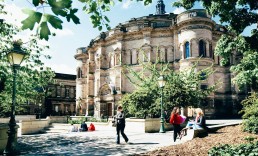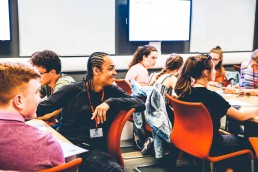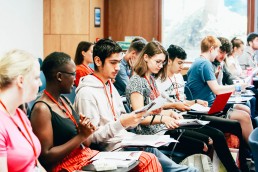Support for care experience applicants
We provide advice and guidance to help care experienced students through the application process as they can face significant and cumulative barriers to enter higher education.
Why
Only 6% of young people who are in care aged 16 continue into higher education by the age of 19 (Department of Education). People who have spent time in local authority care can face significant barriers to entering higher education. This can include lower attainment, lack of positive role models, low expectations from carers and advisers, low aspirations, concerns about being able to afford higher education, lack of information and advice prior to and at the point of application to university, problems with accommodation, low levels of personal and emotional support from professionals, lack of personal support networks, low levels of confidence to self-identify and ask for support pro-actively. Care leavers are therefore a severely under-represented group and improving access for care leavers remains a priority.
What
The University has a Corporate Parenting responsibility and our plans within this area are laid out within our Corporate Parenting Strategy. We provide advice and guidance to help care experienced students through the application process and support once they join University.
The University aims to make an offer of a place to any care experienced applicant who meets the minimum entry requirements (or is predicted to do so) for the course to which they have applied, where this is possible.
Prospective students and offer holders who identify themselves as having been in care on their UCAS application form are put in touch with the named contact and provided with support throughout the admissions process as well as with information on the comprehensive support package available at the University of Edinburgh.
Who
Students are eligible for this support if they’ve been in local authority care in the UK and are under 26 on the first day of the academic year in which their degree begins (1 August for most students).
Related Posts
Support for care experience applicants
We provide advice and guidance to help care experienced students through the application process as they can…
Information, advice and guidance
Staff from the Widening Participation (WP) team offer one-to-one information, advice and guidance to both…
MOOC Football: More than a game
A credit bearing short course for adult learners to explore a number of different literacies such as data,…
Moving on
Moving On is an induction programme specifically for WP students – school leavers and adult learners - that…
University of Edinburgh’s Access Programme
A part-time programme that aims to provide adult returners will the skills, confidence and qualifications to…
The Lothians equal access programme
LEAPS promotes higher education amongst young people whose school careers have been affected by adverse…
Aces Edinburgh
ACES Edinburgh is a multi-exit programme, supporting eligible S4-S6 pupils in local state schools who are…
REACH – Edinburgh
Reach Edinburgh is a multi-exit programme, supporting eligible S4-S6 pupils in local state schools who are…
Sutton Trust Summer School
For S5/Year 12 pupils from underrepresented backgrounds who attend state schools across the UK. Every summer…
Fundraising for Widening Participation intiatives
In this post, David Haines, Head of Philanthropy, University Programmes at the University of Edinburgh,…
Information, advice and guidance
Staff from the Widening Participation (WP) team offer one-to-one information, advice and guidance to both potential and current applicants (and their supporters/advisers) from Widening Participation backgrounds via phone or email – or in person.
Why
Applicants from WP backgrounds often do not have access to the same level of support as their peers when making choices about higher education; or they may have a lot of support, but their supporters and advisers do not have much experience supporting higher education applicants. Offering expert one-to-one information, advice and guidance to these applicants and their supporters and advisers, not only helps to “level the playing field”, but also has the potential to encourage applicants from underrepresented backgrounds to consider the University as an option, when they might not have otherwise done so.
What
Throughout their prospective journey – and at whatever age or stage they are – our experienced WP staff are available to discuss any questions which potential or current applicants and their supporters / advisers might have, over the phone, via email or in person. This could include, for example, advising on subject choices at school or college, University entry requirements and application processes. We endeavour to provide supportive, transparent, and altruistic advice which is most helpful to the individual and their specific situation and needs.
Who
The WP team welcomes enquiries from all potential and current applicants and their supporters and advisers via the contact details below. Any which cannot be answered by the team will be forwarded to the relevant University department or external partner to ensure a full service.
Related Posts
Support for care experience applicants
We provide advice and guidance to help care experienced students through the application process as they can…
Information, advice and guidance
Staff from the Widening Participation (WP) team offer one-to-one information, advice and guidance to both…
MOOC Football: More than a game
A credit bearing short course for adult learners to explore a number of different literacies such as data,…
Moving on
Moving On is an induction programme specifically for WP students – school leavers and adult learners - that…
University of Edinburgh’s Access Programme
A part-time programme that aims to provide adult returners will the skills, confidence and qualifications to…
The Lothians equal access programme
LEAPS promotes higher education amongst young people whose school careers have been affected by adverse…
Aces Edinburgh
ACES Edinburgh is a multi-exit programme, supporting eligible S4-S6 pupils in local state schools who are…
REACH – Edinburgh
Reach Edinburgh is a multi-exit programme, supporting eligible S4-S6 pupils in local state schools who are…
Sutton Trust Summer School
For S5/Year 12 pupils from underrepresented backgrounds who attend state schools across the UK. Every summer…
Fundraising for Widening Participation intiatives
In this post, David Haines, Head of Philanthropy, University Programmes at the University of Edinburgh,…
MOOC Football: More than a game
A credit bearing short course for adult learners to explore a number of different literacies such as data, health, finance, political economy and social justice through the example of football.
Why
Many adults are considering re-engaging with their education but due to a history of negative experiences in the classroom are reluctant to take the first steps. Football more than a game introduces various curriculum areas that at first may seem irrelevant to the learners, but told through the lens of football, it brings relevancy and interest to them – and can then lead to a further pathway of learning should they wish. As a pre-access course, Football More than a Game facilitates the first step back into education via a safe and familiar environment through inclusive pedagogical practice.
What
Football: More Than A Game is a fully-funded seven-week face to face taught programme at SCQF level 7, with associated credit. It is taught in local football stadia, in the heart of working class communities. It works with the community foundations of professional football teams with Hibernian FC being the first club to become a partner. The course content delivers a taste of interdisciplinary learning in a number of different subject areas such as, data literacy, history, physical & mental wellbeing and political economy for example. In order to pass the course and receive the relevant credits, students submit a final written piece of work. The course will be expanding to other clubs over the coming year.
Who
The Academy of Sport, Widening Participation and the Centre for Open Learning collaborate to deliver the course in partnership with the Hibernian FC Community Foundation. There is also an online version of course, part of the University’s Massive Open Online Course (MOOC) offerings – which delivers the same content through a similar rationale globally. The online version is delivered in partnership between the Academy of Sport and Widening Participation.
Related Posts
Support for care experience applicants
We provide advice and guidance to help care experienced students through the application process as they can…
Information, advice and guidance
Staff from the Widening Participation (WP) team offer one-to-one information, advice and guidance to both…
MOOC Football: More than a game
A credit bearing short course for adult learners to explore a number of different literacies such as data,…
Moving on
Moving On is an induction programme specifically for WP students – school leavers and adult learners - that…
University of Edinburgh’s Access Programme
A part-time programme that aims to provide adult returners will the skills, confidence and qualifications to…
The Lothians equal access programme
LEAPS promotes higher education amongst young people whose school careers have been affected by adverse…
Aces Edinburgh
ACES Edinburgh is a multi-exit programme, supporting eligible S4-S6 pupils in local state schools who are…
REACH – Edinburgh
Reach Edinburgh is a multi-exit programme, supporting eligible S4-S6 pupils in local state schools who are…
Sutton Trust Summer School
For S5/Year 12 pupils from underrepresented backgrounds who attend state schools across the UK. Every summer…
Fundraising for Widening Participation intiatives
In this post, David Haines, Head of Philanthropy, University Programmes at the University of Edinburgh,…
Moving on
Moving On is an induction programme specifically for WP students – school leavers and adult learners – that runs the week before our Welcome Week. It is a comprehensive introduction to undergraduate life – navigating campus, learning & teaching, support and welfare.
Why
Beginning university can be a daunting prospect for all of our students. For those from widening participation backgrounds, this transition can feel even more daunting for a number of reasons including commuting, caring and financial responsibilities, as well as experiencing imposter syndrome as an under-represented group. Moving On has been designed to alleviate some of these concerns and support participants to have a bespoke and supportive introduction to university to help them feel confident and a sense of belonging ahead of embarking upon their degree studies.
What
Moving On provides a free week-long introduction to undergraduate life and includes an orientation to the University’s campuses and buildings; an opportunity to attend lectures and tutorials; guidance on using the University’s virtual learning environment and library, and an introduction to the range of support services available at the University. Participants meet other new students and make new friends ahead of beginning their course.
Who
All eligible students from the local area who hold an offer from The University of Edinburgh and fulfil our widening participation criteria are invited to attend. Moving On is part of the University of Edinburgh’s Widening Participation strategy and is organised by the University’s Centre for Open Learning, with help and contributions from many other services including the Edinburgh University Student Union (EUSA), Institute for Academic Development, University Careers Service and Student Counselling Service.
Related Posts
Support for care experience applicants
We provide advice and guidance to help care experienced students through the application process as they can…
Information, advice and guidance
Staff from the Widening Participation (WP) team offer one-to-one information, advice and guidance to both…
MOOC Football: More than a game
A credit bearing short course for adult learners to explore a number of different literacies such as data,…
Moving on
Moving On is an induction programme specifically for WP students – school leavers and adult learners - that…
University of Edinburgh’s Access Programme
A part-time programme that aims to provide adult returners will the skills, confidence and qualifications to…
The Lothians equal access programme
LEAPS promotes higher education amongst young people whose school careers have been affected by adverse…
Aces Edinburgh
ACES Edinburgh is a multi-exit programme, supporting eligible S4-S6 pupils in local state schools who are…
REACH – Edinburgh
Reach Edinburgh is a multi-exit programme, supporting eligible S4-S6 pupils in local state schools who are…
Sutton Trust Summer School
For S5/Year 12 pupils from underrepresented backgrounds who attend state schools across the UK. Every summer…
Fundraising for Widening Participation intiatives
In this post, David Haines, Head of Philanthropy, University Programmes at the University of Edinburgh,…
University of Edinburgh's Access Programme
A part-time programme that aims to provide adult returners will the skills, confidence and qualifications to study for a degree in the University’s College of Arts, Humanities and Social Sciences.
Why
The University of Edinburgh’s Access Programme is an entry route for WP groups including mature students, students from Scotland’s most deprived communities and those who have care experience. The programme aims to foster diversity and inclusion through creating specific opportunity for adult returners from diverse backgrounds and under-represented groups to study with us, and supporting them through the transition to degree study.
What
The University of Edinburgh’s Access Programme is a part-time programme that aims to provide adult returners with the skills, confidence and qualifications to study for a degree in the University’s College of Arts, Humanities and Social Sciences. The Access Programme offers an integrated and inclusive programme of skills-based courses at SCQF level 7 and, through a holistic approach, fosters transformative learning.
Students study 60 credits over two semesters, with an emphasis placed upon early formative work and learning from feedback, ahead of a range of summative assessments in semester 2. Successful completion of the Access Programme can result in progression to a degree programme within the University.
Who
The University of Edinburgh’s Access Programme, offered by the Centre for Open Learning, is for adult returners who do not already have an undergraduate degree, who want to study a degree but maybe haven’t completed Highers (or equivalent) qualifications and have had a continuous gap of at least 3 years at some point in their formal education. The first Access cohort of 50 students began their studies in August 2018 with almost half coming from SIMD20 areas and all those students completed the course and received conditional offers for undergraduate study.
Related Posts
Support for care experience applicants
We provide advice and guidance to help care experienced students through the application process as they can…
Information, advice and guidance
Staff from the Widening Participation (WP) team offer one-to-one information, advice and guidance to both…
MOOC Football: More than a game
A credit bearing short course for adult learners to explore a number of different literacies such as data,…
Moving on
Moving On is an induction programme specifically for WP students – school leavers and adult learners - that…
University of Edinburgh’s Access Programme
A part-time programme that aims to provide adult returners will the skills, confidence and qualifications to…
The Lothians equal access programme
LEAPS promotes higher education amongst young people whose school careers have been affected by adverse…
Aces Edinburgh
ACES Edinburgh is a multi-exit programme, supporting eligible S4-S6 pupils in local state schools who are…
REACH – Edinburgh
Reach Edinburgh is a multi-exit programme, supporting eligible S4-S6 pupils in local state schools who are…
Sutton Trust Summer School
For S5/Year 12 pupils from underrepresented backgrounds who attend state schools across the UK. Every summer…
Fundraising for Widening Participation intiatives
In this post, David Haines, Head of Philanthropy, University Programmes at the University of Edinburgh,…
The Lothians equal access programme
LEAPS promotes higher education amongst young people whose school careers have been affected by adverse economic or social circumstances or who come from communities with little or no experience of higher education.
Why
The Scottish Government recognises a range of barriers which can prevent school pupils from considering and/or accessing higher education. The Scottish Funding Council (SFC) supports a number of national programmes (SHEP – Schools for Higher Education Programme) which aim to remove those barriers. LEAPS delivers the SHEP programme in the South East of Scotland. The University of Edinburgh provides funding and staff support, working with LEAPS to raise aspirations towards university and offer information, advice and guidance to LEAPS-eligible pupils so that they can make strong applications. Working with LEAPS, their target schools and partner institutions also strengthens the ties between those schools and our local institutions and provides opportunities for sharing best practice in Widening Participation.
What
LEAPS (Lothian Equal Access Programme for School) is an outreach programme, with designated LEAPS link teachers in each school. They operate a tiered approach so that schools with the lowest progression to higher education are offered the full programme of activities from S3-S6. In schools with higher progression rates, pupils who fulfil additional WP eligibility criteria are offered individualised support during S5 and S6. Activities include in-school workshops, individualised support, campus visits and conferences and ‘High Flyers’, a summer school for pupils from Group 1+ schools* in partnership with 5 local universities. LEAPS also recruit student volunteers from across their partner institutions to support their work.
Who
The tiered approach is outlined below. Please visit the LEAPS website for the current school groupings.
*Group 1+ Schools
LEAPS support any student in a Group 1+ school who has the potential to achieve a minimum of 3 highers by the time they finish school.
Group 1 Schools
LEAPS support any student in a Group 1 school who has the potential to achieve a minimum of 3 highers by the time they finish school.
Group 2 Schools
In Group 2 schools, LEAPS support students who have the potential to achieve a minimum of 3 highers by the time they finish school and match one or more of the following LEAPS eligibility criteria:
- student who is first generation in family to apply to higher education
- student from a low income background
- student who has spent time in care or being looked after or who is estranged.
- student who is a young carer
- student who lives in one of Scotland’s 20% most disadvantaged communities as defined by the Scottish Index of Multiple Deprivation (SIMD20).
Related Posts
Support for care experience applicants
We provide advice and guidance to help care experienced students through the application process as they can…
Information, advice and guidance
Staff from the Widening Participation (WP) team offer one-to-one information, advice and guidance to both…
MOOC Football: More than a game
A credit bearing short course for adult learners to explore a number of different literacies such as data,…
Moving on
Moving On is an induction programme specifically for WP students – school leavers and adult learners - that…
University of Edinburgh’s Access Programme
A part-time programme that aims to provide adult returners will the skills, confidence and qualifications to…
The Lothians equal access programme
LEAPS promotes higher education amongst young people whose school careers have been affected by adverse…
Aces Edinburgh
ACES Edinburgh is a multi-exit programme, supporting eligible S4-S6 pupils in local state schools who are…
REACH – Edinburgh
Reach Edinburgh is a multi-exit programme, supporting eligible S4-S6 pupils in local state schools who are…
Sutton Trust Summer School
For S5/Year 12 pupils from underrepresented backgrounds who attend state schools across the UK. Every summer…
Fundraising for Widening Participation intiatives
In this post, David Haines, Head of Philanthropy, University Programmes at the University of Edinburgh,…
Aces Edinburgh
ACES Edinburgh is a multi-exit programme, supporting eligible S4-S6 pupils in local state schools who are considering pursuing degrees or careers in art, design or architecture.
Why
Programmes within art, design and architecture are very popular and competitive and require more than just good school exam results. For most of these courses there are additional steps as part of the application process and each university requires something different. In addition, methods of teaching and assessment at degree level in these courses can be very different compared to secondary school level.
To be successful, applicants need to be able to demonstrate their creative development and potential to succeed in their chosen visual creative degree. All of these requirements together can make accessing these courses and the subsequent careers extremely challenging for pupils from widening participation backgrounds who may not have the same networks and support as other pupils. ACES (Access to Creative Education Scotland) Edinburgh supports pupils to make strong and well-considered applications to these courses. ACES is part of a national programme, funded by the Scottish Funding Council (SFC) and alongside its sister project Reach, forms the ‘Access to High Demand Professions’ programme.
What
ACES activities and events typically include:
- One-to-one pre-application guidance for pupils, their family and advisers
- Advice and guidance for each subject strand and extra-curricular requirements
- Workshops on personal statements, interview techniques and portfolios
- Specialist creative workshops
- Portfolio preparation courses
- Gallery and exhibition visits
- Career exploration workshops and events
- Opportunities to meet and shadow current students
All the activities are free of charge and ACES provides materials for the pupils. ACES works in partnership with the Edinburgh College of Art (ECA) and the Centre for Open Learning (COL). ACES staff are available for in-demand support via phone and email for pupils, their families and advisers. ACES is a multi-exit programme, so offers encouragement, and impartial advice on the relevant subject areas, guidance on school subject choices and support with all aspects of the application process and various pathways available.
Who
Any S4-S6 pupil in a state school in the south east of Scotland who:
- Is care experienced; or
- Lives in a postcode area within the Scottish Index of Multiple Deprivation lowest 20% (SIMD20) or 40% (SIMD40); or
- Is a young carer
- Is estranged from their family; or
- Is a refugee or asylum seeker; or
- Is entitled to or are in receipt of Free School Meals (FSM)
For pupils in other areas, there are three other ACES programmes which make up the national ACES programme: ACES Glasgow School of Art; ACES Robert Gordon University and ACES University of Dundee.
Related Posts
Support for care experience applicants
We provide advice and guidance to help care experienced students through the application process as they can…
Information, advice and guidance
Staff from the Widening Participation (WP) team offer one-to-one information, advice and guidance to both…
MOOC Football: More than a game
A credit bearing short course for adult learners to explore a number of different literacies such as data,…
Moving on
Moving On is an induction programme specifically for WP students – school leavers and adult learners - that…
University of Edinburgh’s Access Programme
A part-time programme that aims to provide adult returners will the skills, confidence and qualifications to…
The Lothians equal access programme
LEAPS promotes higher education amongst young people whose school careers have been affected by adverse…
Aces Edinburgh
ACES Edinburgh is a multi-exit programme, supporting eligible S4-S6 pupils in local state schools who are…
REACH – Edinburgh
Reach Edinburgh is a multi-exit programme, supporting eligible S4-S6 pupils in local state schools who are…
Sutton Trust Summer School
For S5/Year 12 pupils from underrepresented backgrounds who attend state schools across the UK. Every summer…
Fundraising for Widening Participation intiatives
In this post, David Haines, Head of Philanthropy, University Programmes at the University of Edinburgh,…
REACH - Edinburgh
Reach Edinburgh is a multi-exit programme, supporting eligible S4-S6 pupils in local state schools who are considering pursuing degrees or careers in law, medicine or veterinary medicine.
Why
Law, medicine and veterinary medicine are very popular and competitive vocational programmes, which require more than just good school exam results. For most of these courses there are additional steps as part of the application process and each university requires something different. To be successful, applicants need to be able to demonstrate that they have a realistic idea of the life, skills and qualities required of a lawyer, doctor, or vet through completing career exploration and work experience. Navigating all of these requirements can make accessing these courses and the subsequent careers extremely intimidating and challenging for pupils from widening participation backgrounds who may not have the same networks and support as other pupils. Reach Edinburgh supports pupils to make strong and well-considered applications to these courses. Reach is part of a national programme, funded by the Scottish Funding Council (SFC) and alongside its sister project ACES, forms the ‘Access to High Demand Professions’ network across Scotland.
What
Reach activities and events typically include:
- One-to-one pre-application guidance pupils, their family and advisers
- Advice and guidance for each of the subject strands and extra-curricular requirements
- Workshops on personal statements, interview techniques and the UCAT
- Work experience placements
- On-campus career exploration workshops and events
- Opportunities to meet and shadow current students
- Information sessions for parents
All activities are free to attend and Reach can offer funding towards travel for eligible pupils for certain events. Reach staff are also available for in-demand support via phone and email for pupils, their families and advisers. Reach is a multi-exit programme, so offers encouragement, and impartial advice on the three career areas, guidance on school subject choices and support with all aspects of the UCAS application.
Who
Any S4-S6 pupil in a state school in the south east of Scotland who:
- Is care experienced; or
- Lives in a postcode area within the Scottish Index of Multiple Deprivation lowest 20% (SIMD20) or 40% (SIMD40); or
- Is a young carer; or
- Is estranged from their family; or
- Is a refugee or asylum seeker; or
- Is entitled to or are in receipt of Free School Meals (FSM)
For pupils in other areas, there are four other Reach programmes which make up the national Reach programme: Reach Glasgow, Reach Dundee, Reach St Andrews and Reach Aberdeen.
Related Posts
Support for care experience applicants
We provide advice and guidance to help care experienced students through the application process as they can…
Information, advice and guidance
Staff from the Widening Participation (WP) team offer one-to-one information, advice and guidance to both…
MOOC Football: More than a game
A credit bearing short course for adult learners to explore a number of different literacies such as data,…
Moving on
Moving On is an induction programme specifically for WP students – school leavers and adult learners - that…
University of Edinburgh’s Access Programme
A part-time programme that aims to provide adult returners will the skills, confidence and qualifications to…
The Lothians equal access programme
LEAPS promotes higher education amongst young people whose school careers have been affected by adverse…
Aces Edinburgh
ACES Edinburgh is a multi-exit programme, supporting eligible S4-S6 pupils in local state schools who are…
REACH – Edinburgh
Reach Edinburgh is a multi-exit programme, supporting eligible S4-S6 pupils in local state schools who are…
Sutton Trust Summer School
For S5/Year 12 pupils from underrepresented backgrounds who attend state schools across the UK. Every summer…
Fundraising for Widening Participation intiatives
In this post, David Haines, Head of Philanthropy, University Programmes at the University of Edinburgh,…
Sutton Trust Summer School
For S5/Year 12 pupils from underrepresented backgrounds who attend state schools across the UK. Every summer we offer a free residential week for 120 pupils aimed at providing a complete experience of student life at a Russell Group University.
Why
The Sutton Trust work to raise aspirations of young people from low and middle-income backgrounds and to increase their chances of accessing top universities and the professions, by delivering programmes, evidence-based research, and influencing public policy. The Summer School is an aspiration and attainment-raising programme that provides school students who are about to apply to university with the opportunity to gain a complete, realistic and rewarding experience of student life.
What
The Sutton Trust Summer School is a fully funded (free) 1-week residential programme that takes place every summer on the University of Edinburgh campuses, as well as around the city. Eligible students can apply via a centralised registration form that includes a teacher reference but not a personal statement. Selected students sign up to two subject areas of interest to them and participate in academic-led lectures, seminars, tutorials and project work. Additional guidance sessions include admissions information, application support, funding guidance, and career pathway exploration. The Summer School also offers a full social programme to explore student life outside of academic sessions. Students are supported throughout the week by staff and current students.
Who
120 pupils in S5 or Year 12 (or equivalent) who have always attended a state-funded school or college in the UK. Pupils are more likely to gain a place if they meet the following criteria: first generation in their family to attend university; achieved at least 5 A or B passes at National 5, or 5 A or 6 grades at GCSE; taking subjects relevant to the course applied for; have been eligible for free school meals at any time during secondary schooling; attend a school or college with a below average A-level or Higher point score and/or a low rate of progression to higher education; live in a neighbourhood with a low rate of progression to higher education and/or high levels of socio-economic deprivation; receiving EMA.
Priority is given to those who are estranged, refugees, young carers, and are (or have been) looked after, accommodated or in care.
Related Posts
Support for care experience applicants
We provide advice and guidance to help care experienced students through the application process as they can…
Information, advice and guidance
Staff from the Widening Participation (WP) team offer one-to-one information, advice and guidance to both…
MOOC Football: More than a game
A credit bearing short course for adult learners to explore a number of different literacies such as data,…
Moving on
Moving On is an induction programme specifically for WP students – school leavers and adult learners - that…
University of Edinburgh’s Access Programme
A part-time programme that aims to provide adult returners will the skills, confidence and qualifications to…
The Lothians equal access programme
LEAPS promotes higher education amongst young people whose school careers have been affected by adverse…
Aces Edinburgh
ACES Edinburgh is a multi-exit programme, supporting eligible S4-S6 pupils in local state schools who are…
REACH – Edinburgh
Reach Edinburgh is a multi-exit programme, supporting eligible S4-S6 pupils in local state schools who are…
Sutton Trust Summer School
For S5/Year 12 pupils from underrepresented backgrounds who attend state schools across the UK. Every summer…
Fundraising for Widening Participation intiatives
In this post, David Haines, Head of Philanthropy, University Programmes at the University of Edinburgh,…
Educated Pass
Educated Pass works with young males from working class communities that play for local youth football teams. Using their commitment to athleticism, we engage the players – and bring relevancy to – school curriculum and societal issues through the lens of football.
Why
Young males from working class communities are underachieving in the classroom. It is important to bring relevancy to school curriculum and promote positive life choices through a medium that holds respect and value – that aligns with their identity. Through the lens of football we work with S2 pupils prior to their first curriculum choices, this is done through the local youth football teams that they play for. Relevancy is built through the stories of professional high profile athletes and student athlete role models; this narrative immediately connects through a shared language. Drawing on early notions of Olympism (Olympic Charter 2007); ‘Blending sport with culture and education’, we deliver the project through ‘the educational value of good example’ and a strong reference to the principles of interdisciplinary learning.
What
Educated Pass offers a series of classes each year that covers aspects of the curriculum from modern languages to biology. We also address societal issues such as human rights, health inequalities and racism – all delivered through the lens of football.Classes also cover careers exploration in professional sport and other non-sport related areas all via further learning and study at college or university. A key element of the project is also to encourage positive life choices, not just in education but also in matters of health and social relationships. The project also provides extensive opportunities for physical based sessions that illustrate modern sport science thinking and training methods.
Who
The project has a number of partners including the Scottish Youth Football Association, Edinburgh College, West Lothian College and the Hibernian FC Community Foundation. Support is also provided by EUAFC, the Academy of Sport and a number of student athlete role models. Clubs that are invited to take part are based from East Lothian, through Edinburgh City to North Lanarkshire.
Related Posts
Support for care experience applicants
We provide advice and guidance to help care experienced students through the application process as they can…
Information, advice and guidance
Staff from the Widening Participation (WP) team offer one-to-one information, advice and guidance to both…
MOOC Football: More than a game
A credit bearing short course for adult learners to explore a number of different literacies such as data,…
Moving on
Moving On is an induction programme specifically for WP students – school leavers and adult learners - that…
University of Edinburgh’s Access Programme
A part-time programme that aims to provide adult returners will the skills, confidence and qualifications to…
The Lothians equal access programme
LEAPS promotes higher education amongst young people whose school careers have been affected by adverse…
Aces Edinburgh
ACES Edinburgh is a multi-exit programme, supporting eligible S4-S6 pupils in local state schools who are…
REACH – Edinburgh
Reach Edinburgh is a multi-exit programme, supporting eligible S4-S6 pupils in local state schools who are…
Sutton Trust Summer School
For S5/Year 12 pupils from underrepresented backgrounds who attend state schools across the UK. Every summer…
Fundraising for Widening Participation intiatives
In this post, David Haines, Head of Philanthropy, University Programmes at the University of Edinburgh,…















